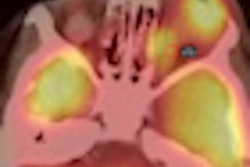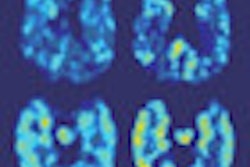Dear AuntMinnie Member,
New research indicates that the PET radiopharmaceutical FDDNP can predict the development of Alzheimer's disease in patients with mild cognitive impairment, according to a study in our Molecular Imaging Digital Community.
Researchers from the University of California, Los Angeles found that FDDNP had higher levels of uptake in abnormal protein deposits called tau tangles, which along with brain plaque can signify the onset of Alzheimer's.
While other PET tracers have been used to image plaque, the researchers believe that FDDNP is unique in its ability to bind to the tangles, which better correlate with Alzheimer's progression than plaque levels, previous research suggests. Read more about the study by clicking here.
In other news, read about a study released this month that found that FDG uptake in the optic nerve on PET/CT scans can be used to measure the effectiveness of chemotherapy for children with retinoblastoma. The results indicate that PET/CT can be used to help direct treatment of retinoblastoma patients before their disease worsens, according to researchers from India. Get more details by clicking here, or visit the community at molecular.auntminnie.com.
MRI and Mediterranean diet
If you're preparing a special Valentine's Day meal tonight, you might want to make it with olive oil. New research with MRI indicates that the Mediterranean diet -- heavy in fish, fruits, vegetables, and monounsaturated fat such as that found in olive oil -- might benefit your brain in addition to your waistline.
Researchers from the University of Miami collected diet data on nearly 1,000 individuals and ranked the study participants based on their level of adherence to a Mediterranean diet. The group then performed MRI scans, calculating participants' levels of white-matter hyperintensity volume, which can be a sign of chronic small-vessel damage.
Participants who stuck more closely to a Mediterranean-style diet had lower levels of white-matter hyperintensity volume. This prompted the researchers to posit that a Mediterranean diet might help protect against the development of small-vessel disease.
Get the rest of the story by clicking here, or visit our MRI Digital Community at mri.auntminnie.com.




















